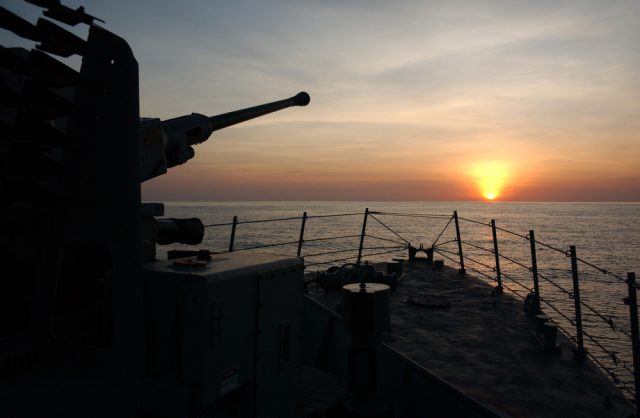A farewell to (writing about) arms
Posted By Andrew Davies on March 21, 2018 @ 06:00

By my count this is my 285th contribution to The Strategist, and it’s my last in my time at ASPI. (But don’t breathe too big a sigh of relief—I intend to blight its virtual pages from beyond from time to time.) Like my long-term colleague Mark Thomson [1], the editors have leant on me to make some parting remarks.
A lot has happened in the defence world since I started here in 2006. ASPI has certainly been an interesting vantage point from which to watch the progress of seven defence ministers, three defence white papers (though we still haven’t finished delivering [2] the force structure from the 2000 version), two and a bit [3] national shipbuilding plans, two wars and the approval of over $100 billion in major projects.
One of the challenges to a job like this is to not slip into a persistently negative mindset regarding defence policy and procurement practices. After all, ASPI’s job is to question the prevailing wisdom, and to be Jiminy Cricket to Defence’s Pinocchio. The trick is to be constructive while being critical, and to put forward an alternative way ahead when discussing even the poorest outcomes of previous decision-making.
For example, even the Super Seasprite fiasco—the defence acquisition equivalent of a knee-high full toss on leg stump for commentators like me—provided an opportunity to explain the virtues of larger helicopters that could bring a dipping sonar capability back to the fleet.
And it’s always worth remembering that, despite all the missteps, cost overruns and schedule slippages along the way, the ADF of today is very much more capable than that of 2006, when I first joined ASPI. There are many things that could (and should) have been done faster, cheaper or better—and some that shouldn’t have been done at all—but the average outcome has been an improvement to the nation’s defence capabilities. Of course, it would be alarming indeed if that weren’t the case, given the size of the defence budget and the number of skilled people involved in the enterprise.
And that’s where I’ll have to confess to having some concerns about the state of our national defence policy. I think we’re still paying too much, both in dollar terms and in broader opportunity costs, for our defence capability. And we’re being too patient about getting it. I haven’t won many friends in defence industry with my views on local procurement versus off-the-shelf purchases, but that’s something I’m unrepentant about.
What we have today is an uneasy amalgam of defence capability development and defence industry sector support, hiding behind a veneer of ‘sovereign capability’ or ‘jobs and growth’. I spend 6,000 words explaining that in a recent essay in Australian Foreign Affairs (available in all good newsagents and bookshops [4]) so I won’t belabour the point here. If our strategic circumstances looked more benign it would only be a misuse of resources, but it runs the risk of also being a dreadful strategic oversight.
During my tenure the F-35 joint strike fighter and the future submarine have been the gifts that keep giving. The former was the biggest program on the books when I took on the job, and the latter is the biggest as I go. As I discussed in my previous post, the F-35 program hasn’t yet delivered what we want [5]—and won’t for some time yet. Even the initial capability is ten years late into the bargain.
And we also had to spend $6 billion on an ‘interim’ Super Hornet capability (later topped up with another $3 billion on Growlers) that’s now looking more like a 20-plus–year force structure element. I’ve often been at loggerheads with Defence people—and sometimes Lockheed Martin people—who thought I was taking too pessimistic a view of the F-35’s progress and the program management. I think the data is in now, and most of ASPI’s prognostications on the subject have aged fairly gracefully.
The submarines are another matter again. The F-35 is slowly—too slowly—maturing, but we’re at the other end of the submarine life cycle, not yet even having a design to move towards production. The fact that the first of them will be delivered around 2030, and the last closer to 2050, is perhaps the most egregious example of procurement plans being out of whack with strategic circumstance.
We run the risk of committing $36 billion in today’s money (please allow me a moment of self-indulgence to say I told you so [6]) for a capability that will be delivered after the dust has settled on the strategic competition that will shape the Asia–Pacific region for the next century.
But that’s for the future to reveal, and I’m happy to hand over the reins of ASPI’s Defence and Strategy Program to Michael Shoebridge, and commentary on these matters to Michael and to Marcus Hellyer—two very capable people. I’ve written and said enough over the years that nobody is going to die wondering what I think.
Let me finish with a thank you to everyone who has taken the time to argue with me during my time in this job—the contest of ideas is ultimately what it’s about.
Article printed from The Strategist: https://www.aspistrategist.org.au
URL to article: https://www.aspistrategist.org.au/farewell-writing-arms/
URLs in this post:
[1] Like my long-term colleague Mark Thomson: https://www.aspistrategist.org.au/the-best-of-times/
[2] still haven’t finished delivering: https://www.aspistrategist.org.au/thirteen-years-and-counting-the-delivery-of-the-2000-defence-white-paper/
[3] and a bit: http://www.defence.gov.au/dmo/Multimedia/Future_submarines_industry_skilling_plan.pdf
[4] available in all good newsagents and bookshops: https://www.australianforeignaffairs.com/essay/2018/02/trump-in-asia
[5] hasn’t yet delivered what we want: https://www.aspistrategist.org.au/f-35-update-good-bad-unknown/
[6] I told you so: https://www.aspistrategist.org.au/current-cost-future-submarine/
Click here to print.